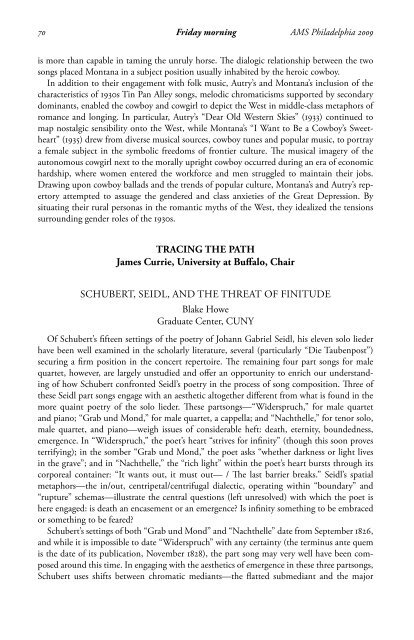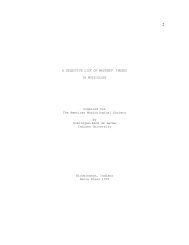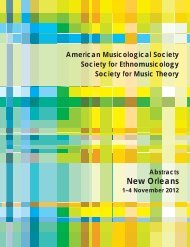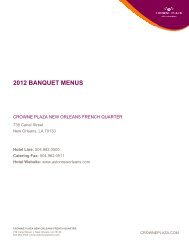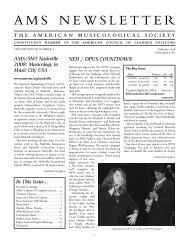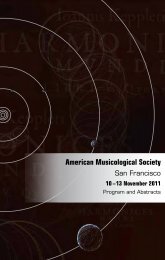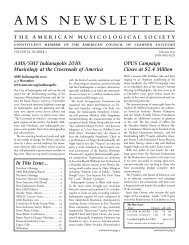AMS Philadelphia 2009 Abstracts - American Musicological Society
AMS Philadelphia 2009 Abstracts - American Musicological Society
AMS Philadelphia 2009 Abstracts - American Musicological Society
Create successful ePaper yourself
Turn your PDF publications into a flip-book with our unique Google optimized e-Paper software.
70 Friday morning <strong>AMS</strong> <strong>Philadelphia</strong> <strong>2009</strong><br />
is more than capable in taming the unruly horse. The dialogic relationship between the two<br />
songs placed Montana in a subject position usually inhabited by the heroic cowboy.<br />
In addition to their engagement with folk music, Autry’s and Montana’s inclusion of the<br />
characteristics of 1930s Tin Pan Alley songs, melodic chromaticisms supported by secondary<br />
dominants, enabled the cowboy and cowgirl to depict the West in middle-class metaphors of<br />
romance and longing. In particular, Autry’s “Dear Old Western Skies” (1933) continued to<br />
map nostalgic sensibility onto the West, while Montana’s “I Want to Be a Cowboy’s Sweetheart”<br />
(1935) drew from diverse musical sources, cowboy tunes and popular music, to portray<br />
a female subject in the symbolic freedoms of frontier culture. The musical imagery of the<br />
autonomous cowgirl next to the morally upright cowboy occurred during an era of economic<br />
hardship, where women entered the workforce and men struggled to maintain their jobs.<br />
Drawing upon cowboy ballads and the trends of popular culture, Montana’s and Autry’s repertory<br />
attempted to assuage the gendered and class anxieties of the Great Depression. By<br />
situating their rural personas in the romantic myths of the West, they idealized the tensions<br />
surrounding gender roles of the 1930s.<br />
trAcing the PAth<br />
James currie, university at Buffalo, chair<br />
SCHUBERT, SEIDL, AND THE THREAT OF FINITUDE<br />
Blake Howe<br />
Graduate Center, CUNY<br />
Of Schubert’s fifteen settings of the poetry of Johann Gabriel Seidl, his eleven solo lieder<br />
have been well examined in the scholarly literature, several (particularly “Die Taubenpost”)<br />
securing a firm position in the concert repertoire. The remaining four part songs for male<br />
quartet, however, are largely unstudied and offer an opportunity to enrich our understanding<br />
of how Schubert confronted Seidl’s poetry in the process of song composition. Three of<br />
these Seidl part songs engage with an aesthetic altogether different from what is found in the<br />
more quaint poetry of the solo lieder. These partsongs—“Widerspruch,” for male quartet<br />
and piano; “Grab und Mond,” for male quartet, a cappella; and “Nachthelle,” for tenor solo,<br />
male quartet, and piano—weigh issues of considerable heft: death, eternity, boundedness,<br />
emergence. In “Widerspruch,” the poet’s heart “strives for infinity” (though this soon proves<br />
terrifying); in the somber “Grab und Mond,” the poet asks “whether darkness or light lives<br />
in the grave”; and in “Nachthelle,” the “rich light” within the poet’s heart bursts through its<br />
corporeal container: “It wants out, it must out— / The last barrier breaks.” Seidl’s spatial<br />
metaphors—the in/out, centripetal/centrifugal dialectic, operating within “boundary” and<br />
“rupture” schemas—illustrate the central questions (left unresolved) with which the poet is<br />
here engaged: is death an encasement or an emergence? Is infinity something to be embraced<br />
or something to be feared?<br />
Schubert’s settings of both “Grab und Mond” and “Nachthelle” date from September 1826,<br />
and while it is impossible to date “Widerspruch” with any certainty (the terminus ante quem<br />
is the date of its publication, November 1828), the part song may very well have been composed<br />
around this time. In engaging with the aesthetics of emergence in these three partsongs,<br />
Schubert uses shifts between chromatic mediants—the flatted submediant and the major


